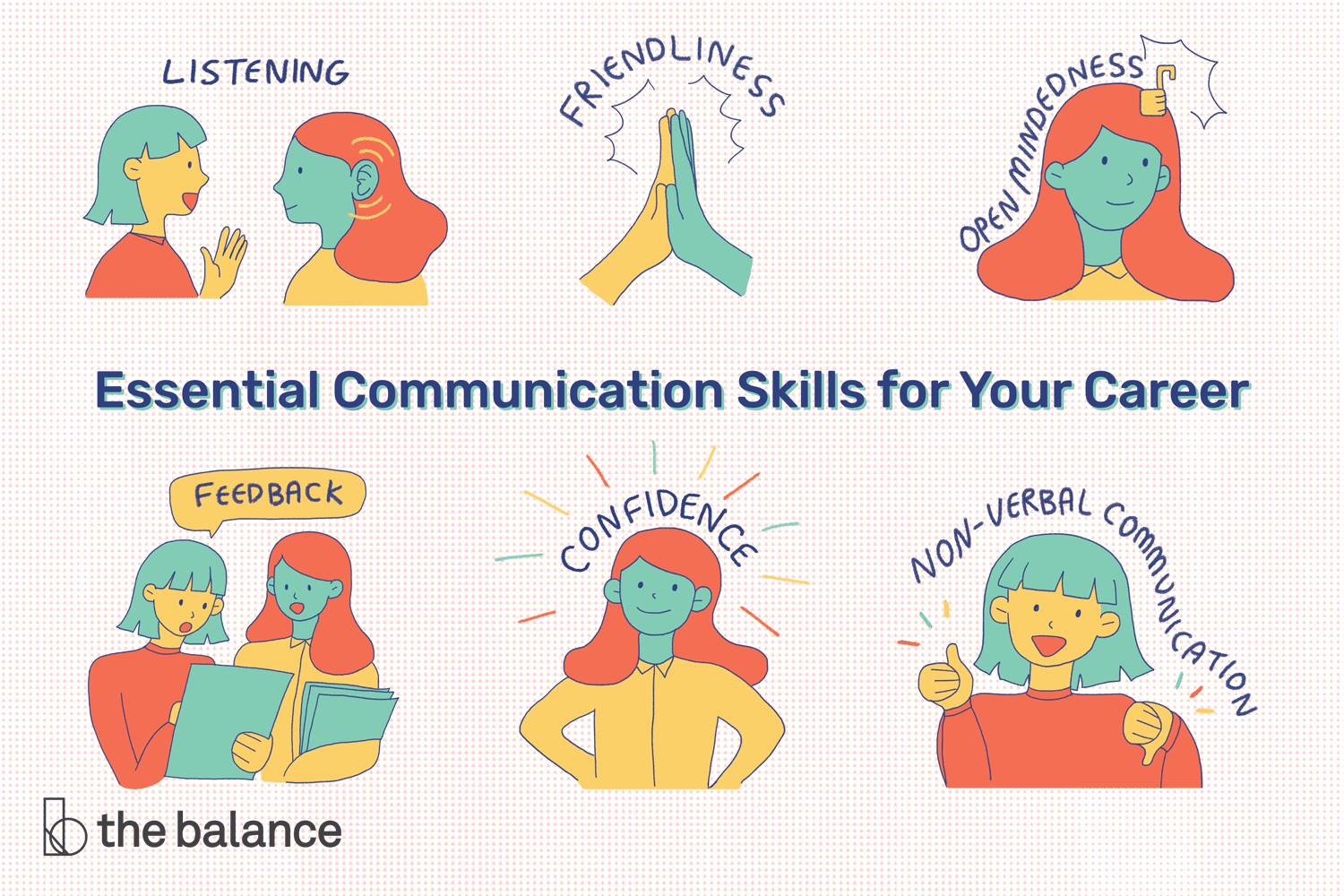Top Social Skills for Workplace Success
The top social skills for workplace success include effective communication and strong interpersonal skills. In today’s professional environment, these skills are crucial in building relationships, collaborating with colleagues, and resolving conflicts, ultimately leading to higher productivity and job satisfaction.
Equipping oneself with these social skills enables individuals to communicate ideas clearly, actively listen to others, express empathy, and work effectively in teams. By leveraging effective communication and interpersonal skills, professionals can foster positive work environments, strengthen professional relationships, and achieve career success.
:max_bytes(150000):strip_icc()/happy-businesswomen-using-digital-tablet-in-office-513367999-80f1f6a35ce7406897abff04728aefdc.jpg)
Credit: www.thebalancemoney.com
Communication Skills
Effective communication is a vital skill that plays a crucial role in workplace success. When individuals possess strong communication skills, they can effectively express their ideas, build relationships, and collaborate with others. In this blog post, we will explore three important subcategories of communication skills: active listening, assertiveness, and non-verbal communication.
Active Listening
Active listening is more than just hearing someone’s words. It involves giving your full attention to the speaker, understanding their message, and providing appropriate feedback. By actively listening, you demonstrate respect and empathy towards your colleagues, fostering a positive working environment.
To become an active listener, you can:
- Maintain eye contact, nodding your head as a sign of understanding.
- Refrain from interrupting or finishing others’ sentences.
- Ask clarifying questions to ensure you fully comprehend their message.
Assertiveness
Being assertive means expressing your thoughts, needs, and opinions in a clear and respectful manner. This skill helps you stand up for yourself while considering the perspectives of others. By being assertive, you can effectively communicate your ideas, collaborate with colleagues, and solve problems together.
To practice assertiveness, you can:
- Use “I” statements to express your thoughts and feelings without blaming others.
- Clearly articulate your ideas or concerns without being aggressive or passive.
- Listen actively to others’ viewpoints and respond assertively, without becoming defensive.
Non-verbal Communication
Non-verbal communication involves conveying messages through facial expressions, body language, and gestures. These cues can often speak louder than words, influencing how others perceive and interpret your communication. Mastering non-verbal communication can enhance your interactions with colleagues and help you establish rapport and credibility.
| Non-Verbal Cues | Significance |
|---|---|
| Eye contact | Shows interest and engagement |
| Posture | Reflects confidence and attentiveness |
| Facial expressions | Conveys emotions and intentions |
| Gestures | Enhances verbal communication and adds emphasis |
By paying attention to these non-verbal cues and aligning them with your verbal messages, you can strengthen your communication skills and create stronger connections.
Mastering communication skills, including active listening, assertiveness, and non-verbal communication, can greatly contribute to your workplace success. These skills allow you to effectively convey your ideas, build relationships, and collaborate with others, ultimately leading to a more productive and harmonious work environment.
Collaboration Skills
Collaboration skills are a fundamental aspect of workplace success. In today’s interconnected world, being able to work effectively with others is essential for achieving collective goals. Individuals with strong collaboration skills are more likely to thrive in team-based environments, foster positive relationships, and contribute to a harmonious work atmosphere. Collaboration skills encompass various abilities, including teamwork and conflict resolution.
Teamwork
Teamwork is the foundation of successful collaboration within a workplace. It involves individuals coming together to achieve a common objective, pooling their diverse skills and knowledge to maximize productivity and innovation. Effective teamwork requires open and clear communication, active listening, and a willingness to share ideas and responsibilities.
Here are some essential factors that contribute to strong teamwork:
- Clear Roles and Responsibilities: Every team member must understand their role, responsibilities, and how their work contributes to the overall goal.
- Effective Communication: Clear and open communication is vital for team members to understand each other’s perspectives, avoid misunderstandings, and provide constructive feedback.
- Respect and Support: A supportive environment fosters trust and encourages team members to express their opinions, share ideas, and offer assistance when needed.
- Delegation: Delegating tasks based on individual expertise and strengths ensures an efficient distribution of workload and promotes a sense of ownership among team members.
- Collaborative Problem Solving: Encouraging collaborative problem-solving enables teams to tackle complex challenges together, leveraging the diverse skills and experiences of each member.
Conflict Resolution
Conflict is a natural part of any collaborative setting. However, the ability to resolve conflicts promptly and constructively is crucial for maintaining harmonious work relationships and promoting productivity. Conflict resolution involves addressing differing opinions, finding common ground, and working towards collective solutions that benefit all parties involved.
Here are some strategies for effective conflict resolution:
- Active Listening: Actively listening to others’ perspectives allows for a better understanding of the underlying issues and facilitates finding common ground.
- Empathy and Understanding: Demonstrating empathy towards others’ viewpoints helps create an atmosphere of mutual respect and can lead to more productive discussions.
- Communication: Clear and respectful communication is essential during conflict resolution to ensure all parties feel heard and valued.
- Collaboration: Inviting all involved parties to participate in finding a resolution fosters a sense of empowerment and shared responsibility.
- Focus on Solutions: Shifting the focus from blame to finding solutions encourages a problem-solving mindset and paves the way for effective resolutions.
In conclusion, collaboration skills, including teamwork and conflict resolution, play a crucial role in workplace success. By cultivating these skills, individuals can contribute to a positive work environment, foster strong relationships, and achieve collective goals.
Emotional Intelligence
Emotional intelligence is crucial for workplace success. It includes top social skills such as empathy, communication, teamwork, and conflict resolution, which all contribute to a positive and productive work environment.
Self-awareness
Self-awareness is a fundamental aspect of emotional intelligence that plays a crucial role in workplace success. It involves being in tune with your own emotions, recognizing your strengths and weaknesses, and understanding how your feelings impact your behavior and interactions with others.
By developing self-awareness, you can better understand your emotions and effectively manage them in the workplace.
Here are a few key points to keep in mind when it comes to self-awareness:
- Recognize and acknowledge your emotions: Pay attention to how you feel in different situations and reflect on what may be causing those emotions. This awareness allows you to respond appropriately instead of reacting impulsively.
- Identify your strengths and weaknesses: Understanding your strengths enables you to leverage them to your advantage, while acknowledging your weaknesses allows you to seek growth opportunities and collaborate with others who have complementary skills.
- Consider the impact of your emotions on others: Be aware of how your emotions might influence your interactions with colleagues and consider how your behavior can either foster positive relationships or create tension.
Empathy
Empathy refers to the ability to understand and share the feelings of others. In the workplace, demonstrating empathy not only helps build strong relationships but also promotes effective communication and collaboration.
Empathy allows you to relate to your colleagues’ perspectives, needs, and concerns, fostering a supportive and inclusive work environment.
Here are some ways to cultivate empathy:
- Active listening: Show genuine interest in others’ opinions by actively listening and paying attention to their verbal and non-verbal cues. This validates their experiences and helps you understand their perspective.
- Practice perspective-taking: Put yourself in others’ shoes and try to see the situation from their point of view. Consider their emotions, motivations, and challenges to gain a deeper understanding of their needs.
- Offer support and understanding: Respond empathetically to colleagues’ challenges by offering support, reassurance, or advice when appropriate. This creates a sense of trust and encourages a collaborative atmosphere.

Credit: www.dol.gov
Adaptability
One key social skill for workplace success is adaptability. Being able to quickly adjust and thrive in new environments or changing circumstances demonstrates your ability to handle challenges and contribute effectively to the team.
In today’s rapidly changing work environment, adaptability is a crucial social skill for achieving workplace success. The ability to quickly adjust to new situations and embrace change is valued by employers and peers alike. Being adaptable allows individuals to overcome challenges, navigate uncertainties, and thrive in dynamic work settings.
Flexibility
Flexibility is a key aspect of being adaptable in the workplace. It involves being open to new ideas, perspectives, and approaches. Flexibility enables individuals to easily switch gears, adjust priorities, and take on different roles as required. By staying flexible, you become a valuable asset to your team, as your willingness to adapt helps maintain productivity and fosters teamwork.
Here are some ways to enhance your flexibility:
- Embrace changes in procedures, technologies, and work processes
- Be open to feedback and suggestions from colleagues
- Seek opportunities to learn new skills and expand your knowledge
- Volunteer for tasks outside your comfort zone
- Develop a mindset that embraces change as a chance for growth
Resilience
Resilience goes hand in hand with adaptability, as it involves the ability to bounce back from setbacks and persevere in the face of challenges. In today’s competitive and fast-paced work environment, setbacks and failures are inevitable. However, those who are resilient are able to remain focused, maintain a positive attitude, and find solutions even in difficult circumstances.
Here are some tips to improve your resilience:
- Stay optimistic and maintain a growth mindset
- Find healthy ways to deal with stress, such as exercise or mindfulness
- Seek support from colleagues, friends, or mentors
- Learn from your mistakes and use them as opportunities for growth
- Set realistic goals and break them down into manageable tasks
By developing the social skill of adaptability, specifically through flexibility and resilience, individuals can position themselves as valuable and sought-after contributors in any workplace. Embracing change, staying open-minded, and bouncing back from challenges are all signs of a highly adaptable professional.
Problem-solving Skills
Problem-solving skills are essential for workplace success as they enable individuals to navigate through various challenges and find effective solutions. Possessing strong problem-solving skills allows employees to tackle complex situations, adapt to changing circumstances, and contribute to overall organizational success.
Critical Thinking
Critical thinking plays a crucial role in problem-solving as it involves the ability to analyze situations objectively and make logical connections. It allows individuals to assess problems from various angles, evaluate different perspectives, and consider all relevant information before reaching a conclusion. By honing their critical thinking skills, employees can enhance their problem-solving abilities and come up with innovative solutions to complex issues.
Decision Making
Effective decision-making is another vital aspect of problem-solving skills. It involves the ability to evaluate different options, weigh the pros and cons, and make informed choices. Strong decision-making skills enable individuals to consider the potential outcomes and select the most suitable course of action. By making well-informed decisions, employees can resolve problems efficiently and contribute to the overall productivity and success of their team.
To further enhance problem-solving skills, employees may consider following these strategies:
- Identify the problem: Clearly define the issue at hand and understand the desired outcome.
- Gather information: Collect relevant data, facts, and perspectives to gain a comprehensive understanding of the problem.
- Analyze alternatives: Explore different solutions, evaluate their feasibility, and consider their potential impact.
- Brainstorm ideas: Engage in collaborative thinking sessions to generate innovative ideas and approaches.
- Select the best solution: Assess the advantages and disadvantages of each option and choose the solution that aligns with the desired outcome.
- Implement the solution: Take action and implement the chosen solution while monitoring its progress and making adjustments as necessary.
- Evaluate the outcome: Assess the effectiveness of the solution and identify any areas for improvement.
By focusing on critical thinking and decision-making, individuals can develop strong problem-solving skills that will benefit them in the workplace. These skills enable employees to overcome challenges, drive innovative solutions, and contribute to the overall success of their organization.

Credit: www.entrepreneur.com
Frequently Asked Questions Of Top Social Skills For Workplace Success
What Are The Skills For Workplace Success?
To succeed in the workplace, important skills include communication, teamwork, problem-solving, adaptability, and time management. These skills help you collaborate effectively, think critically, adjust to change, and efficiently manage tasks. Enhancing these abilities can contribute to your professional growth and overall career success.
Why Social Skills Are Important For Success?
Social skills are vital for success because they enable effective communication, collaboration, and relationship building, which are key in today’s interconnected world. Good social skills help individuals navigate social situations, work well in teams, influence others, and resolve conflicts. They contribute to personal growth, career advancement, and overall well-being.
What Social Skills Are Most Important?
The most important social skills include effective communication, active listening, empathy, adaptability, and collaboration. These skills help individuals build and maintain relationships, navigate social situations, and work effectively in teams.
Conclusion
Developing strong social skills is crucial for achieving success in the workplace. Effective communication, active listening, collaboration, empathy, and adaptability are all key components in building positive relationships and fostering a productive work environment. By honing these social skills, professionals can enhance their professional growth, improve teamwork, and create a positive impact on their careers.
Embracing these skills will undoubtedly lead to better job prospects, increased job satisfaction, and overall success in the workplace.


